User:Cease/Hobbit Hospital: Difference between revisions
| Line 23: | Line 23: | ||
== Counterplay == | == Counterplay == | ||
One of the main weaknesses of Hobbit Hospital are how slow it is to set up. While there are a number of things you can do to deal with its healing power, oftentimes the best counter is using a Shadow side that puts intense pressure on their Fellowship early in the game to kill off companions before they get all of their toys in play, or using an initially-stronger Free Peoples deck to out[[run]] the hobbits in the early game, setting up an insurmountable lead. The hobbits generally can't heal more than one wound a turn until they get both a healing ally ( | One of the main weaknesses of Hobbit Hospital are how slow it is to set up. While there are a number of things you can do to deal with its healing power, oftentimes the best counter is using a Shadow side that puts intense pressure on their Fellowship early in the game to kill off companions before they get all of their toys in play, or using an initially-stronger Free Peoples deck to out[[run]] the hobbits in the early game, setting up an insurmountable lead. The hobbits generally can't heal more than one wound a turn until they get both a healing ally ({{Card|Farmer Maggot, Chaser of Rascals}}, {{Card|The Gaffer, Sam's Father}}, or {{Card|Rosie Cotton, Hobbiton Lass}}) and one or more copies of {{Card|Hobbit Party Guest}} out. Early aggression can be difficult with how well hobbits [[choke]], though, even when they aren't running choke cards. | ||
Another line of attack is to take advantage of the fact that the Hobbit Hospital only heals hobbits. (I guess Legolas doesn't have health insurance or something.) These decks will almost always have some support characters, either in non-hobbits (like {{Card|Boromir, Son of Denethor}}) or hobbits that aren't protected with strength-boosting conditions like {{Card|A Promise}} or {{Card|Everyone Knows}}. Oftentimes they rely on {{Card|Merry, Friend to Sam}} to stave off [[overwhelm]]s in skirmishes, and he's very vulnerable when wounded. Exhausting Frodo or Sam with [[direct wounding]] can also unexpectedly shut off {{Card|A Promise}}. Clearing out their conditions or possessions can often reduce their ability to skirmish, although bear in mind that {{Card|Pippin, Friend to Frodo}} can protect [[tale]]s and {{Card|Scouring of the Shire}} can protect everything in [[Expanded]] and [[Standard]]. Oftentimes these strategies only force a [[stop]] rather than killing anyone, but hobbits are already quite bad at making [[double move]]s without help from cards like {{Card|Narrow Escape}} or {{Card|Aragorn, Wingfoot}}. | |||
Concentrating pressure through direct wounding, swarming, or strong skirmishers on the non-hobbit characters is one of possible way to exploit this. If they don't have any hobbits, then they probably do not have many strong skirmishers. There are paths to get hobbits to skirmish well, and depending on the format they can include (multiple copies of) {{Card|A Promise}} and/or {{Card|Everyone Knows}}, {{Card|Sam, Great Elf Warrior}}, and {{Card|Pippin, Steadfast Friend}}. {{Card|Merry, Friend to Sam}} (and sometimes {{Card|Boromir, Son of Denethor}}) can help contribute, but unlike some other {{C|Shire}} healing engines, they can't enable additional surprise uses of Merry in the middle of the turn. Even if their skirmishing is enough to survive, they're often not very good at actually killing minions to set up a [[double move]] except with the use of {{Card|Narrow Escape}}. These decks often don't have large strength boosts for all of their hobbits at once, and rely heavily on the survival of the ones they do focus on, so swarming or opportunistic direct wounding can often pick off key characters. Even if you can't kill off the hobbits, it's not often not hard to force a [[stop]]. (Hobbits focused on [[direct wounding]] with cards like {{Card|Mind Your Own Affairs}}, {{Card|Shadowplay}}, and {{Card|Unheeded}} are a different story, but they are even more vulnerable to losing skirmishes to minions who avoid or cannot be killed with direct wounding. In any event, Hobbit Hospital is rarely played with direct wounding.) | |||
---- | ---- | ||
Revision as of 04:05, 13 March 2022
Hobbit Hospital is a Free Peoples strategy that appears in many Shire decks. It's an engine that uses
Shire allies to heal Frodo, Sam, Merry, and/or Pippin. Under ideal circumstances, it can heal five wounds a turn, with extra capacity for burst healing when needed. Along the way it can also choke, remove your opponent's support area conditions, and protect the hobbits from being overwhelmed in skirmishes.
The strategy is most powerful and popular in Fellowship Block, but still appears in every later format where cards from that block are allowed. It falls off somewhat due to the addition of other strong Shire healing engines, like The Shire Countryside (3R113)
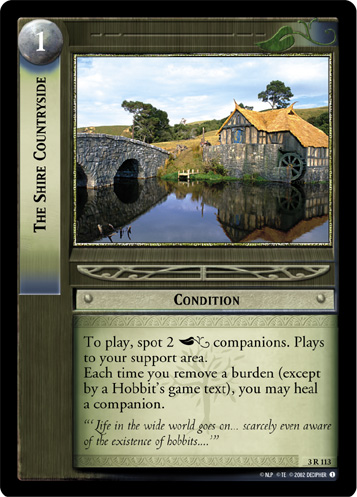 /Nine-fingered Frodo and the Ring of Doom (10C112)
/Nine-fingered Frodo and the Ring of Doom (10C112)
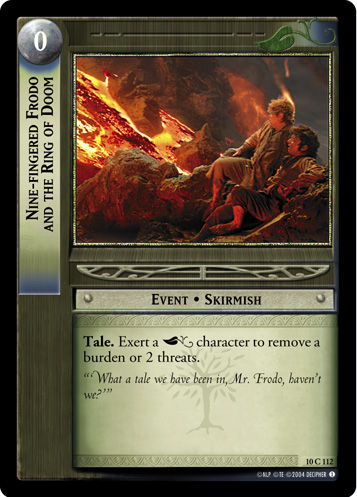 /A Light in His Mind (10U108)
/A Light in His Mind (10U108)
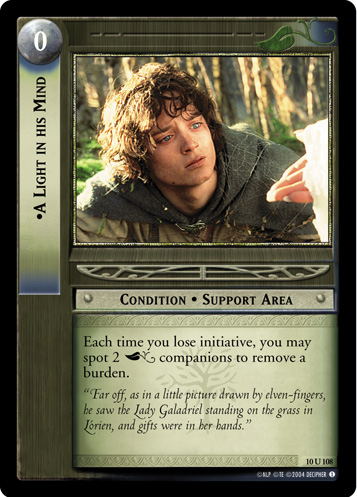 , or Fates Entwined (13U148)
, or Fates Entwined (13U148)
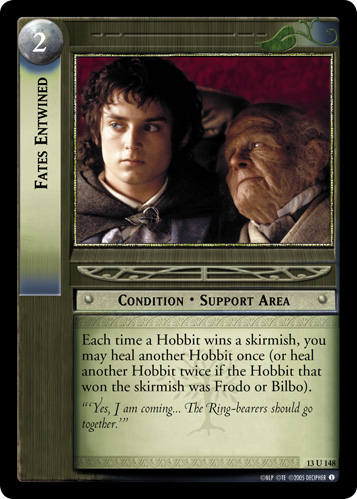 .
.
The Hobbit Healing Pipeline
Unlike many engines in this game, Hobbit Hospital isn't a loop that gradually runs out of steam, but rather a pipeline that absorbs wounds on your Hobbits then disposes of them. The far end of this pipeline, the part that actually reduces the number of wounds in play, consists of Hobbit Party Guest (1C297)
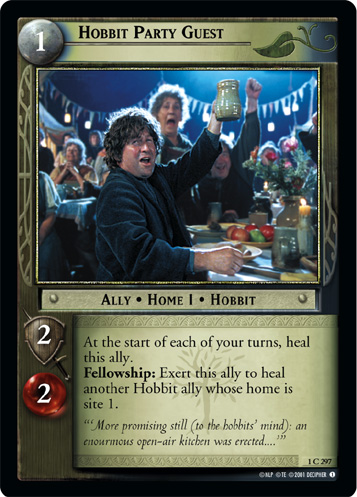 and (almost always) Frodo, Old Bilbo's Heir (1R289)
and (almost always) Frodo, Old Bilbo's Heir (1R289)
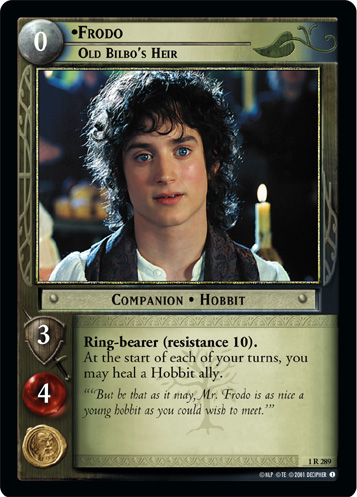 . (You can use some other version of Frodo; it just doesn't work as well.) Each of these cards remove one wound a turn: the Guests from themselves, and Frodo from a hobbit ally of your choice. But healing companions is much more useful than healing allies! So you use Farmer Maggot, Chaser of Rascals (1R288)
. (You can use some other version of Frodo; it just doesn't work as well.) Each of these cards remove one wound a turn: the Guests from themselves, and Frodo from a hobbit ally of your choice. But healing companions is much more useful than healing allies! So you use Farmer Maggot, Chaser of Rascals (1R288)
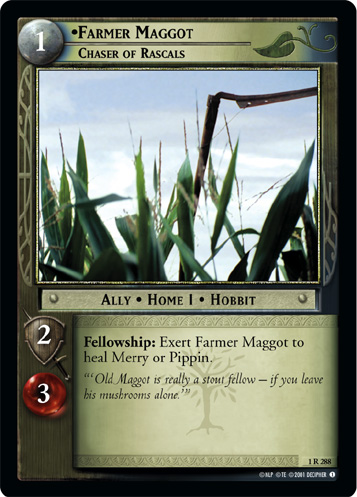 to heal Merry or Pippin, and The Gaffer, Sam's Father (1R291)
to heal Merry or Pippin, and The Gaffer, Sam's Father (1R291)
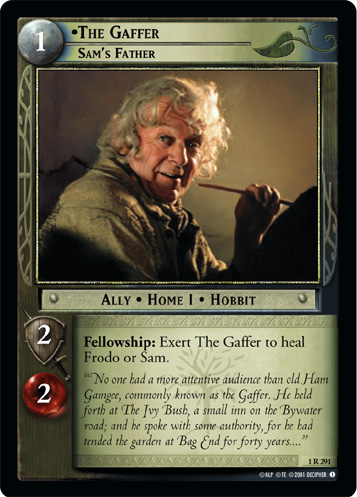 and Rosie Cotton, Hobbiton Lass (1U309)
and Rosie Cotton, Hobbiton Lass (1U309)
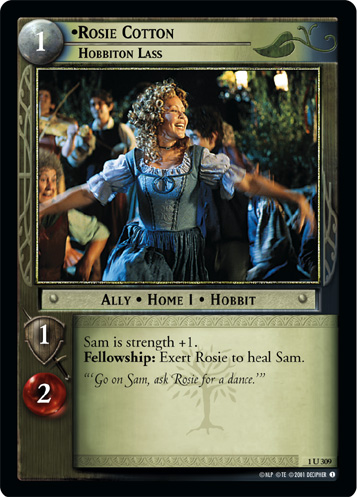 to heal Frodo or Sam. Those allies all exert to heal your companions, effectively transferring the wounds from your Fellowship to your support area. From there, the Guests and Frodo dispose of those support area wounds, freeing up those allies to keep healing your Fellowship.
to heal Frodo or Sam. Those allies all exert to heal your companions, effectively transferring the wounds from your Fellowship to your support area. From there, the Guests and Frodo dispose of those support area wounds, freeing up those allies to keep healing your Fellowship.
That's already a significant amount of value. But, if you ever don't need to heal hobbit companions, you can use that healing other ways. The main beneficiary is Bilbo, Well-spoken Gentlehobbit (2U96)
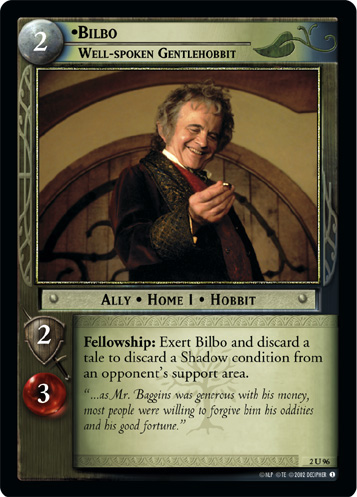 . He can consume your tale conditions to wipe out your opponent's Shadow support area conditions. More importantly, he can use Consorting With Wizards (2R97)
. He can consume your tale conditions to wipe out your opponent's Shadow support area conditions. More importantly, he can use Consorting With Wizards (2R97)
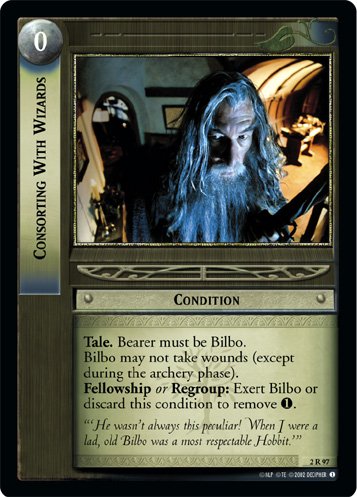 to choke out your opponent's twilight income, reducing the number of Shadow cards they can play at all. Bilbo also allows you to use Practically Everyone Was Invited (2U111)
to choke out your opponent's twilight income, reducing the number of Shadow cards they can play at all. Bilbo also allows you to use Practically Everyone Was Invited (2U111)
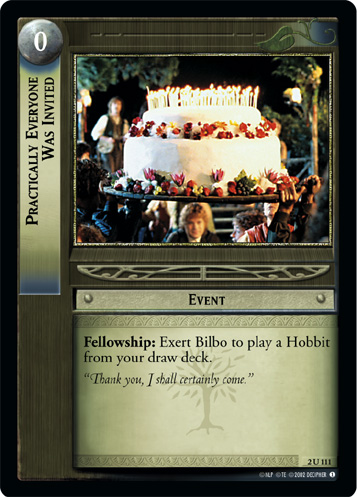 to set up your allies (or a straggler hobbit companion, even), and The Book of Westmarch
to set up your allies (or a straggler hobbit companion, even), and The Book of Westmarch
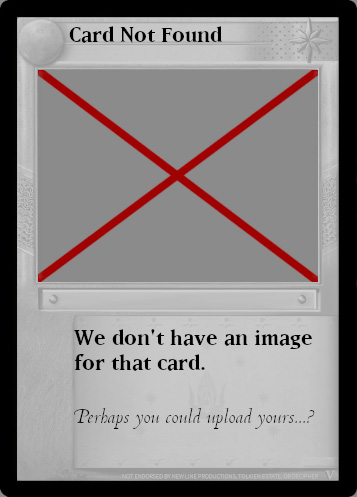 to draw through your deck faster.
to draw through your deck faster.
Support Cards
That's the core of the engine, but there are a few more additions that see some play. If you're using Frodo, Old Bilbo's Heir, you can also use Bounder (1C286)
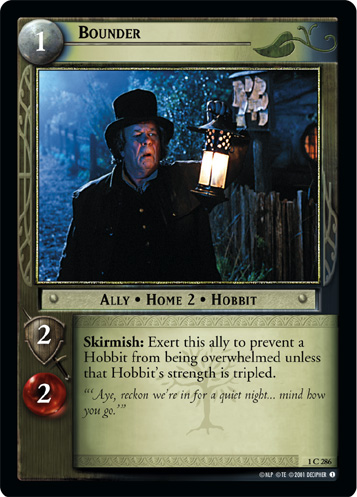 to help prevent your hobbit companions from being overwhelmed in a skirmish. (Guests can't heal Bounder, since his home site isn't site 1.) The only other Hobbit ally of consequence that isn't home site 1 is Bilbo, Retired Adventurer (1R284)
to help prevent your hobbit companions from being overwhelmed in a skirmish. (Guests can't heal Bounder, since his home site isn't site 1.) The only other Hobbit ally of consequence that isn't home site 1 is Bilbo, Retired Adventurer (1R284)
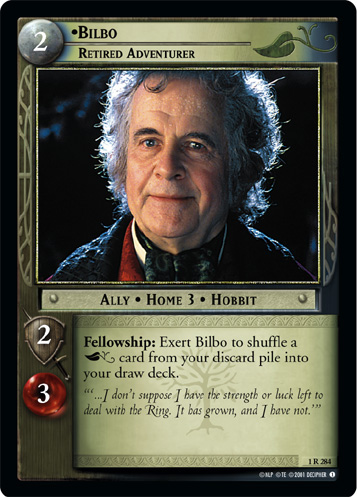 , but he's rarely played due to his weaker game text and inability to be healed by Hobbit Party Guest.
, but he's rarely played due to his weaker game text and inability to be healed by Hobbit Party Guest.
If you're choking with Consorting with Wizards, other choke cards, like A Talent for Not Being Seen (1U316)
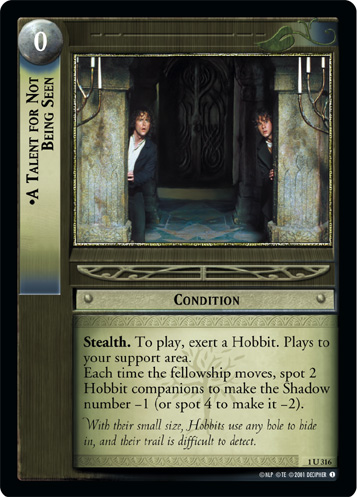 , Sting (1R313)
, Sting (1R313)
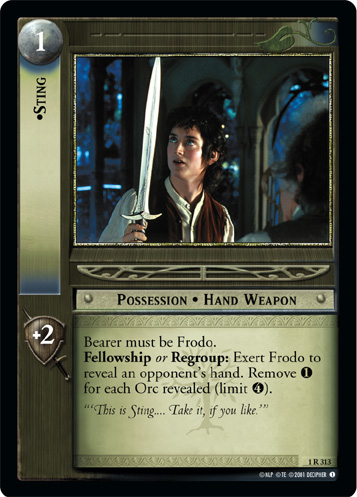 , No Stranger to the Shadows (1U108)
, No Stranger to the Shadows (1U108)
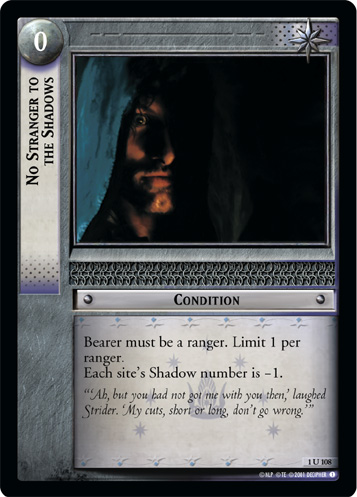 , Aragorn, Heir to the White City (3R38)
, Aragorn, Heir to the White City (3R38)
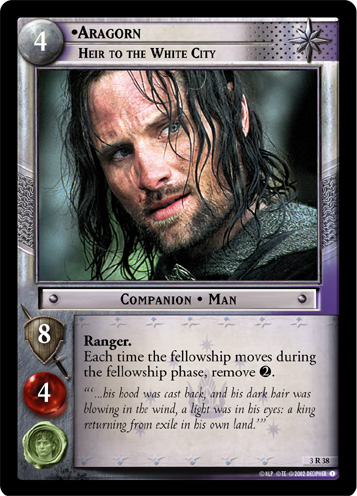 , and Legolas, Dauntless Hunter (4R73)
, and Legolas, Dauntless Hunter (4R73)
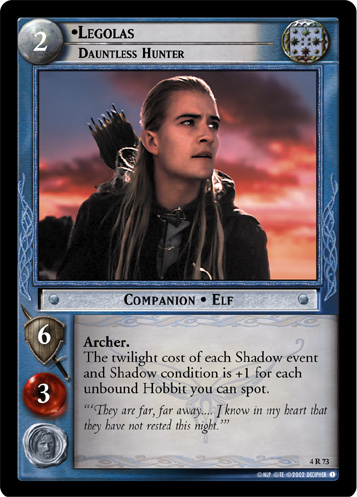 go along with that gameplan. This is most effective in earlier formats like Fellowship Block and Towers Standard, because those formats have site paths with lower [[Twilight (Cost}|twilight numbers]], and many of these cards are banned in later formats. Plus, there's another fairly strong choke tool that only works in Fellowship Block.
go along with that gameplan. This is most effective in earlier formats like Fellowship Block and Towers Standard, because those formats have site paths with lower [[Twilight (Cost}|twilight numbers]], and many of these cards are banned in later formats. Plus, there's another fairly strong choke tool that only works in Fellowship Block.
Hobbit Farmer (1C295)
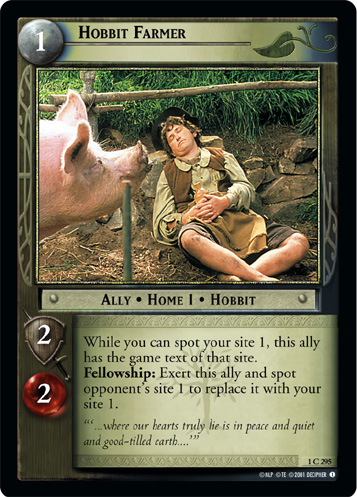 can set up Green Hill Country (1U323)
can set up Green Hill Country (1U323)
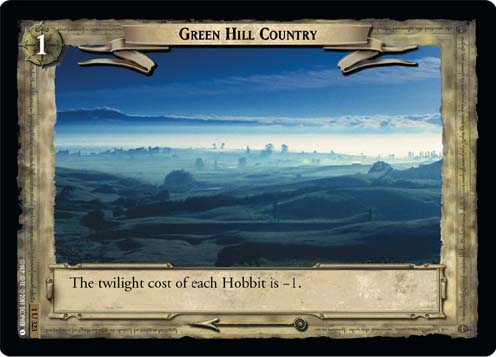 or Westfarthing (1C326)
or Westfarthing (1C326)
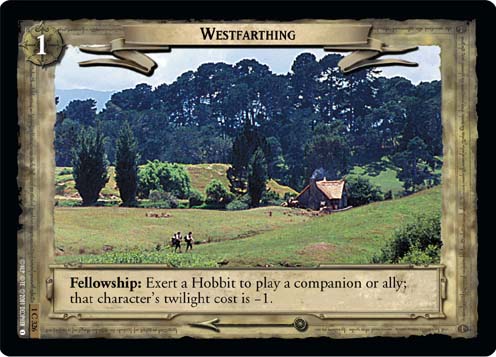 to help you choke. Green Hill Country is better if you're playing mostly hobbits, since it discounts all of your hobbits with no exertion. Plus, you can stack a second Farmer to discount Bilbo or Sam down to zero. Westfarthing can help with non-hobbits, although it's less effective when playing a hand full of allies due to the exertions involved. Since Westfarthing can only reduce costs by -1, there's no need for a second Farmer. Town Center (2C117)
to help you choke. Green Hill Country is better if you're playing mostly hobbits, since it discounts all of your hobbits with no exertion. Plus, you can stack a second Farmer to discount Bilbo or Sam down to zero. Westfarthing can help with non-hobbits, although it's less effective when playing a hand full of allies due to the exertions involved. Since Westfarthing can only reduce costs by -1, there's no need for a second Farmer. Town Center (2C117)
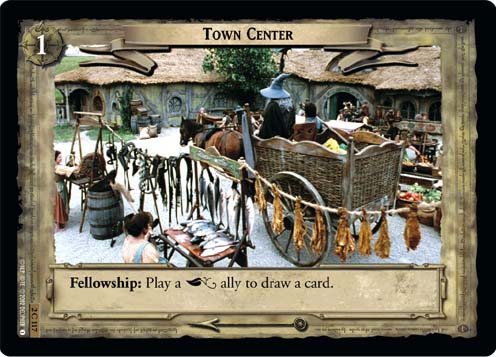 is a third option, if you feel your choke needs are well-handled, and it's another site that doesn't benefit from duplicate Farmers. Unfortunately, Hobbit Farmer only works with the sites from Fellowship Block, so he's only ever played in that format.
is a third option, if you feel your choke needs are well-handled, and it's another site that doesn't benefit from duplicate Farmers. Unfortunately, Hobbit Farmer only works with the sites from Fellowship Block, so he's only ever played in that format.
Since you've got a ton of healing, you can get a lot of use out of cards that exert hobbits for some productive effect. Merry, Friend to Sam (1R302)
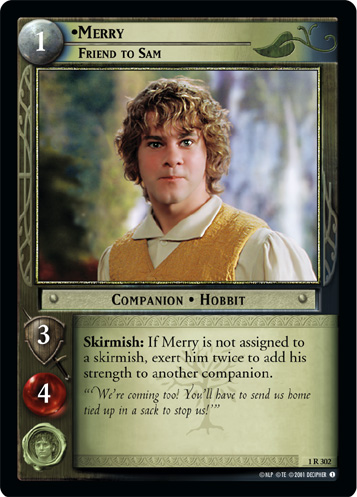 is versatile and powerful, and is popular in every format where he's available. Sting (1R313)
is versatile and powerful, and is popular in every format where he's available. Sting (1R313)
 , Frying Pan (3C108)
, Frying Pan (3C108)
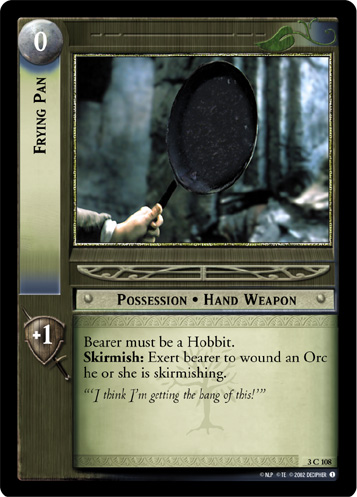 , and Filibert Bolger, Wily Rascal (2C101)
, and Filibert Bolger, Wily Rascal (2C101)
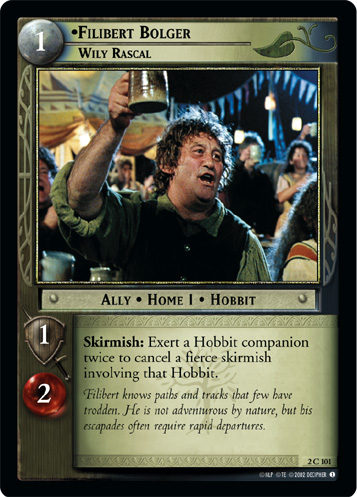 are all strong options in Fellowship Block, although they are also banned in some later formats.
are all strong options in Fellowship Block, although they are also banned in some later formats.
Building a Deck
Counterplay
One of the main weaknesses of Hobbit Hospital are how slow it is to set up. While there are a number of things you can do to deal with its healing power, oftentimes the best counter is using a Shadow side that puts intense pressure on their Fellowship early in the game to kill off companions before they get all of their toys in play, or using an initially-stronger Free Peoples deck to outrun the hobbits in the early game, setting up an insurmountable lead. The hobbits generally can't heal more than one wound a turn until they get both a healing ally (Farmer Maggot, Chaser of Rascals (1R288)
 , The Gaffer, Sam's Father (1R291)
, The Gaffer, Sam's Father (1R291)
 , or Rosie Cotton, Hobbiton Lass (1U309)
, or Rosie Cotton, Hobbiton Lass (1U309)
 ) and one or more copies of Hobbit Party Guest (1C297)
) and one or more copies of Hobbit Party Guest (1C297)
 out. Early aggression can be difficult with how well hobbits choke, though, even when they aren't running choke cards.
out. Early aggression can be difficult with how well hobbits choke, though, even when they aren't running choke cards.
Another line of attack is to take advantage of the fact that the Hobbit Hospital only heals hobbits. (I guess Legolas doesn't have health insurance or something.) These decks will almost always have some support characters, either in non-hobbits (like Boromir, Son of Denethor (1U97)
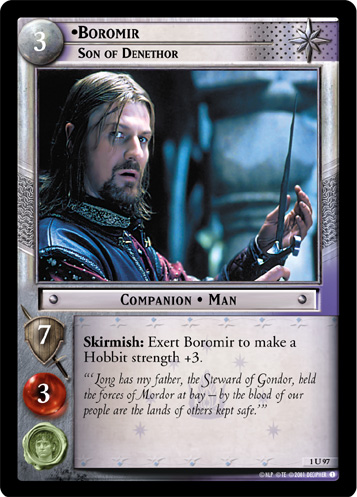 ) or hobbits that aren't protected with strength-boosting conditions like A Promise (2R112)
) or hobbits that aren't protected with strength-boosting conditions like A Promise (2R112)
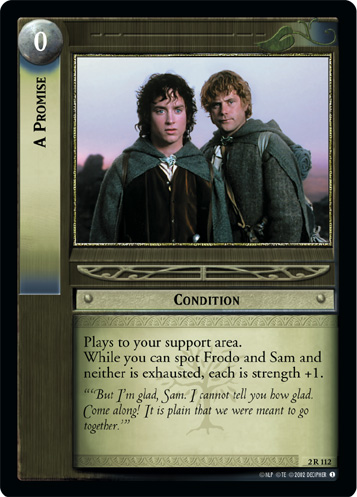 or Everyone Knows (9R50)
or Everyone Knows (9R50)
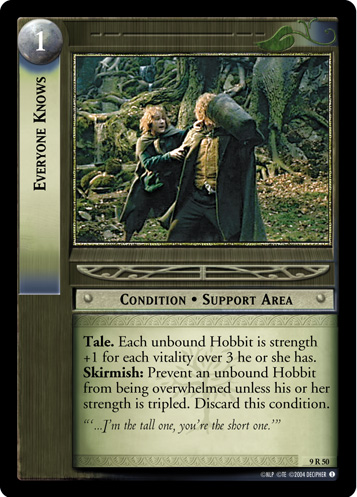 . Oftentimes they rely on Merry, Friend to Sam (1R302)
. Oftentimes they rely on Merry, Friend to Sam (1R302)
 to stave off overwhelms in skirmishes, and he's very vulnerable when wounded. Exhausting Frodo or Sam with direct wounding can also unexpectedly shut off A Promise (2R112)
to stave off overwhelms in skirmishes, and he's very vulnerable when wounded. Exhausting Frodo or Sam with direct wounding can also unexpectedly shut off A Promise (2R112)
 . Clearing out their conditions or possessions can often reduce their ability to skirmish, although bear in mind that Pippin, Friend to Frodo (1C306)
. Clearing out their conditions or possessions can often reduce their ability to skirmish, although bear in mind that Pippin, Friend to Frodo (1C306)
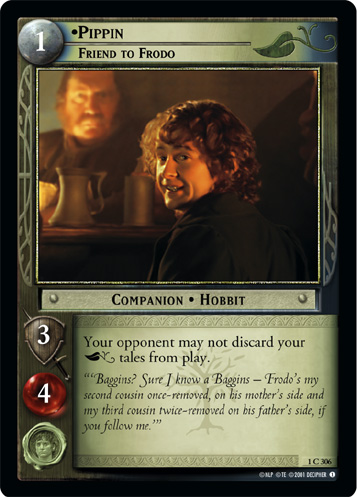 can protect tales and Scouring of the Shire (18R112)
can protect tales and Scouring of the Shire (18R112)
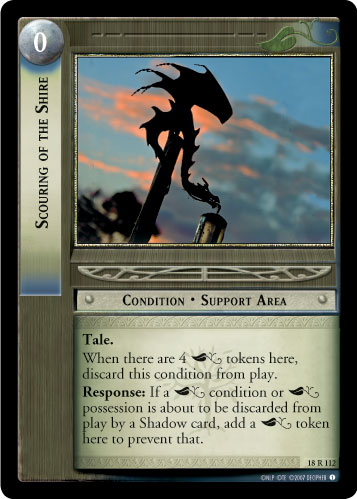 can protect everything in Expanded and Standard. Oftentimes these strategies only force a stop rather than killing anyone, but hobbits are already quite bad at making double moves without help from cards like Narrow Escape (10U111)
can protect everything in Expanded and Standard. Oftentimes these strategies only force a stop rather than killing anyone, but hobbits are already quite bad at making double moves without help from cards like Narrow Escape (10U111)
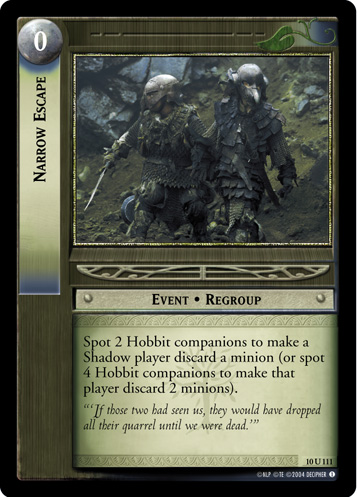 or Aragorn, Wingfoot (4P364)
or Aragorn, Wingfoot (4P364)
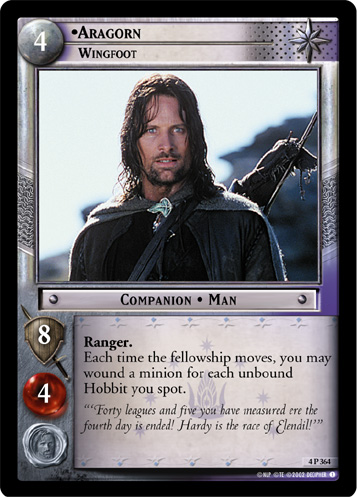 .
.
Concentrating pressure through direct wounding, swarming, or strong skirmishers on the non-hobbit characters is one of possible way to exploit this. If they don't have any hobbits, then they probably do not have many strong skirmishers. There are paths to get hobbits to skirmish well, and depending on the format they can include (multiple copies of) A Promise (2R112)
 and/or Everyone Knows (9R50)
and/or Everyone Knows (9R50)
 , Sam, Great Elf Warrior (10P122)
, Sam, Great Elf Warrior (10P122)
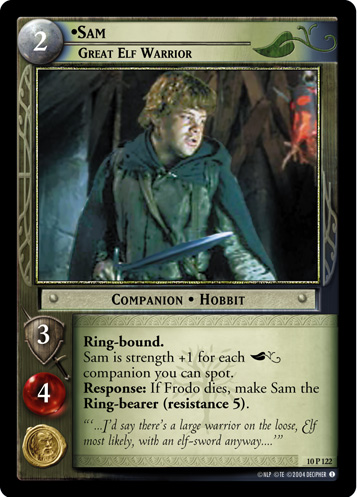 , and Pippin, Steadfast Friend (19P30)
, and Pippin, Steadfast Friend (19P30)
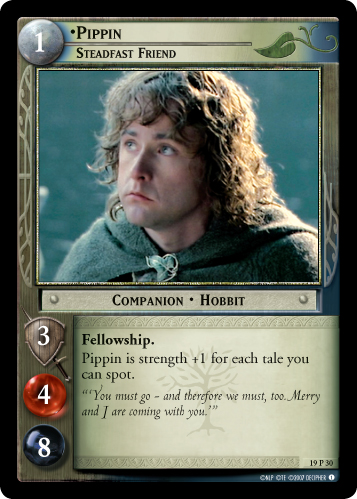 . Merry, Friend to Sam (1R302)
. Merry, Friend to Sam (1R302)
 (and sometimes Boromir, Son of Denethor (1U97)
(and sometimes Boromir, Son of Denethor (1U97)
 ) can help contribute, but unlike some other
) can help contribute, but unlike some other Shire healing engines, they can't enable additional surprise uses of Merry in the middle of the turn. Even if their skirmishing is enough to survive, they're often not very good at actually killing minions to set up a double move except with the use of Narrow Escape (10U111)
 . These decks often don't have large strength boosts for all of their hobbits at once, and rely heavily on the survival of the ones they do focus on, so swarming or opportunistic direct wounding can often pick off key characters. Even if you can't kill off the hobbits, it's not often not hard to force a stop. (Hobbits focused on direct wounding with cards like Mind Your Own Affairs (4U312)
. These decks often don't have large strength boosts for all of their hobbits at once, and rely heavily on the survival of the ones they do focus on, so swarming or opportunistic direct wounding can often pick off key characters. Even if you can't kill off the hobbits, it's not often not hard to force a stop. (Hobbits focused on direct wounding with cards like Mind Your Own Affairs (4U312)
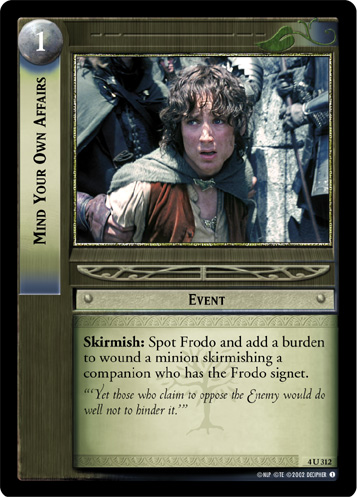 , Shadowplay (10U114)
, Shadowplay (10U114)
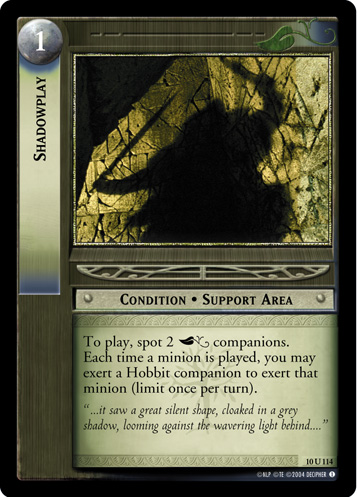 , and Unheeded (8R115)
, and Unheeded (8R115)
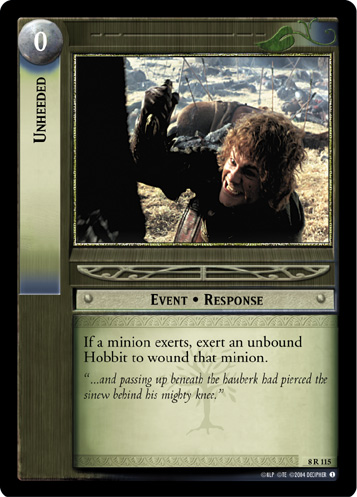 are a different story, but they are even more vulnerable to losing skirmishes to minions who avoid or cannot be killed with direct wounding. In any event, Hobbit Hospital is rarely played with direct wounding.)
are a different story, but they are even more vulnerable to losing skirmishes to minions who avoid or cannot be killed with direct wounding. In any event, Hobbit Hospital is rarely played with direct wounding.)